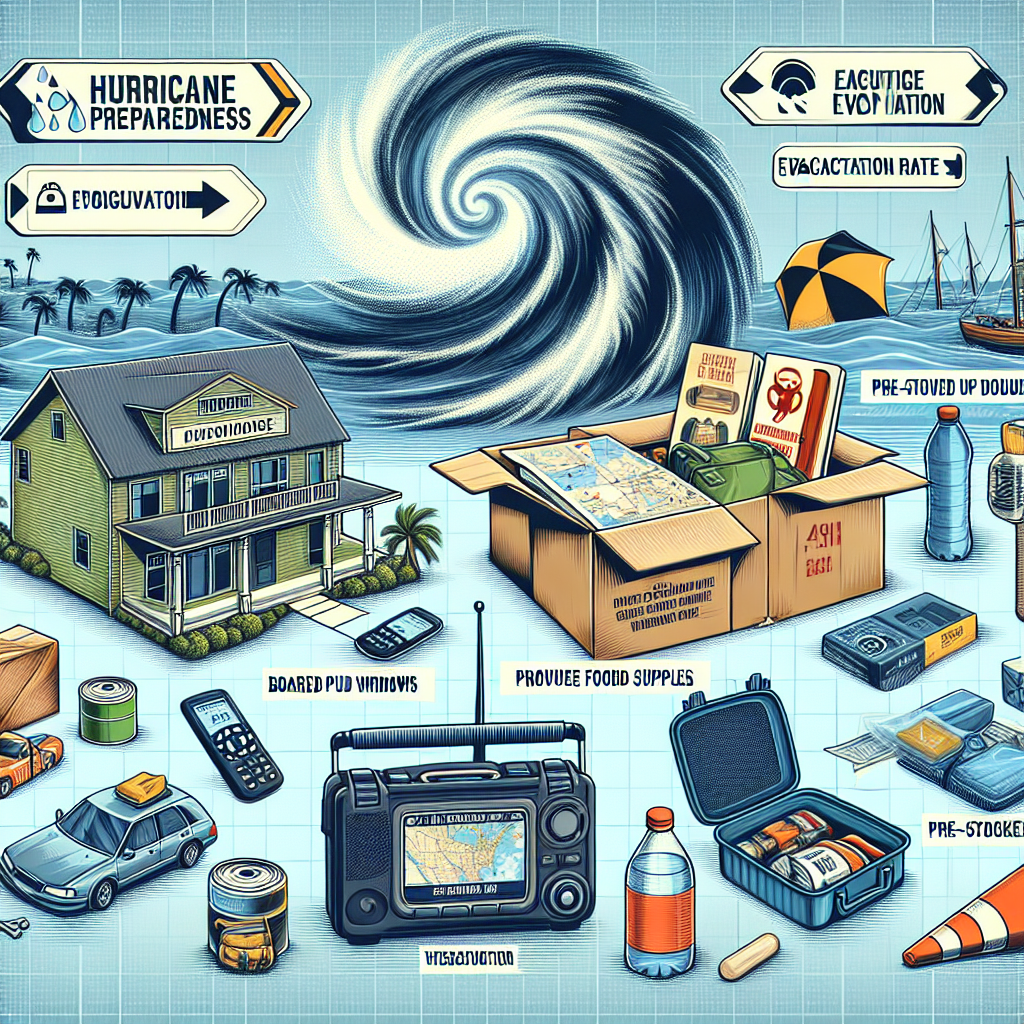Are you prepared for the next big storm? In this article, we will discuss the importance of hurricane readiness and provide you with essential tips to ensure that you and your loved ones stay safe during severe weather conditions. From creating an emergency kit to securing your home, we’ve got you covered. Don’t wait until it’s too late, follow these guidelines to be fully equipped and ready to face any hurricane that comes your way.
Understanding Hurricanes
Definition of a Hurricane
A hurricane is a powerful and destructive tropical cyclone that forms over warm ocean waters. It is characterized by strong winds, heavy rainfall, and storm surges. Hurricanes typically start as a tropical depression, with wind speeds of less than 39 miles per hour (63 kilometers per hour). As the winds increase, it becomes a tropical storm. And when the sustained winds reach or exceed 74 miles per hour (119 kilometers per hour), it is classified as a hurricane.
Categories of Hurricanes
To better understand the strength and potential impact of a hurricane, they are categorized based on the Saffir-Simpson Hurricane Wind Scale. This scale ranges from Category 1 to Category 5, with Category 1 being the weakest and Category 5 being the strongest. The categories are determined by the sustained wind speeds of the hurricane, as well as the potential for storm surges, damage, and flooding. It’s important to know the category of a hurricane when preparing and responding to the storm.
Understanding the Dangers
Hurricanes pose various dangers, and being aware of them is crucial for your safety. High winds are a primary threat during a hurricane, capable of causing structural damage to buildings, uprooting trees, and downing power lines. The heavy rainfall associated with hurricanes can lead to extensive flooding, including flash floods and storm surges near coastal areas. Additionally, hurricanes can spawn tornadoes, posing an additional risk to those in the storm’s path. Understanding the potential dangers of hurricanes allows you to take appropriate precautions and make informed decisions during an approaching storm.
Preparing Your Home for a Hurricane
Securing Windows and Doors
One of the essential steps in preparing your home for a hurricane is securing your windows and doors. Installing storm shutters or boarding up windows with 5/8-inch marine plywood helps protect against wind-driven debris and minimizes the risk of shattered glass. It’s also vital to reinforce entry doors to prevent them from being forced open by strong winds. Ensuring the structural integrity of your home’s openings is key to reducing the potential for damage during a hurricane.

Clearing Your Yard
A well-prepared yard can help mitigate potential damage during a hurricane. Trim back any overhanging tree branches that could be broken off by strong winds and cause damage. Secure loose outdoor items such as patio furniture, grills, and children’s toys, as these can become dangerous projectiles in high winds. Remove any debris or loose gravel that could be picked up and carried by strong gusts of wind. Taking the time to clear your yard of potential hazards significantly reduces the risk of damage during a hurricane.
Protecting Your Roof
In a hurricane, the roof of your home is particularly vulnerable to damage. Have a professional inspect your roof to ensure it is in good condition, with no loose or damaged shingles. Reinforce the roof with hurricane straps or clips that can improve its ability to withstand high winds. Regularly clean your gutters and downspouts to prevent water from overflowing and causing damage. It is also advisable to have a supply of tarps and roofing materials on hand to make temporary repairs if needed. Taking proactive measures to protect your roof helps safeguard your entire home during a hurricane.
Creating a Hurricane Preparedness Kit
Essential Items to Include
Preparing a hurricane preparedness kit is crucial for ensuring your safety and well-being during and after a hurricane. Your kit should include essential items such as a battery-powered flashlight, extra batteries, a portable radio, a first aid kit, and a whistle for signaling for help. It is also important to have a supply of personal hygiene products, including hand sanitizer, toilet paper, and wet wipes. Additionally, include a supply of cash, important phone numbers, and a list of medications with dosage instructions.
Emergency Food and Water Supplies
During a hurricane, access to clean drinking water and non-perishable food is essential. Be prepared with a supply of bottled water, allowing for at least one gallon per person per day for a minimum of three days. Non-perishable food items such as canned goods, protein bars, and dried fruits are ideal for your emergency food supply. Remember to include a manual can opener and disposable plates, cups, and utensils. Consider any dietary restrictions or preferences of those in your household when selecting food items for your emergency kit.

First Aid and Medications
Having a well-stocked first aid kit is vital during a hurricane when medical assistance may be limited. Your first aid kit should include adhesive bandages, gauze pads, antiseptic wipes, pain relievers, and any necessary prescription medications. It is crucial to regularly check and replenish the supplies in your first aid kit to ensure they remain in good condition and have not expired. Additionally, keep a list of emergency medical contacts and detailed instructions on how to administer any medications for yourself or your family members.
Developing an Evacuation Plan
Understanding Evacuation Zones
In areas prone to hurricanes, local authorities establish evacuation zones to ensure the safety of residents. Understanding your evacuation zone is vital for planning and responding to a hurricane. Familiarize yourself with the evacuation routes and shelters designated for your zone. Stay informed of any updates or changes from local authorities and be ready to evacuate when instructed. Additionally, ensure you are aware of the specific needs and arrangements for evacuating individuals with disabilities or medical conditions.
Planning Route and Transportation
When developing your evacuation plan, identify the safest and most efficient evacuation routes from your location to designated shelters or safer areas. Be prepared for increased traffic congestion and consider alternative routes. If you have personal transportation, ensure it is in good working condition and fuel it in advance. If relying on public transportation, research the availability and schedules of evacuation buses, trains, or other means of transport. Plan alternative arrangements if you do not have access to a personal vehicle or public transportation.
Making Arrangements for Pets
Pets are important members of many households, and it is essential to plan for their safety during a hurricane. Identify pet-friendly shelters or boarding facilities in advance, as not all evacuation shelters accept pets. Keep your pet’s identification tags up to date and have a secure carrier or leash on hand. Prepare an emergency kit for your pets, including food, water, medication, and comfort items. Familiarize yourself with local pet evacuation procedures and plan accordingly to ensure the safety and well-being of your pets during a hurricane.
Ensuring Personal Safety During a Hurricane

Staying Informed with Weather Alerts
During a hurricane, staying informed about the changing weather conditions is crucial for your safety. Listen to a battery-powered NOAA Weather Radio or access reliable weather websites and mobile applications for regular updates. Familiarize yourself with the different weather alerts, such as hurricane watches and warnings, and understand their meanings. Follow the guidance and instructions provided by local authorities and evacuate if necessary. Staying informed allows you to make informed decisions and take appropriate actions to protect yourself during a hurricane.
Taking Shelter Indoors
When a hurricane is approaching, it is essential to seek shelter indoors to protect yourself from the dangerous elements. Identify a safe room in your home, preferably a windowless interior room on the lowest level. Stock the room with essential supplies from your preparedness kit, including a battery-powered radio, flashlights, and extra batteries. Have a mattress or heavy blankets available to provide additional protection against flying debris. Avoid windows, exterior doors, and areas with large unsupported spans, such as a garage or open-concept space.
Avoiding Flooded Areas
Flooding is a significant risk during a hurricane, and it’s important to avoid flooded areas for your safety. Even a few inches of moving water can sweep a person off their feet, and submerged items may not be visible or pose a danger. Stay away from low-lying areas, rivers, and streams prone to flooding. Do not attempt to walk or drive through flooded roads, as they may be deeper than they appear or have hidden hazards. If your area is at risk of flooding, follow evacuation orders and move to higher ground or a designated shelter.
Protecting Important Documents and Valuables
Backing Up Digital Files
Protecting your important documents and valuable files is essential to ensure you can recover them after a hurricane. Consider backing up your digital files to a cloud storage service or an external hard drive that you can safely take with you in the event of an evacuation. Regularly update the backup to include new documents or changes. This ensures that even if physical copies are lost or damaged, you can still access important information such as identification documents, insurance policies, and financial records.

Creating a Document Storage Plan
In addition to digital backups, it is important to have a plan for storing physical documents during a hurricane. Use waterproof and fireproof containers or store your important documents in a safety deposit box at a secure off-site location. Make sure to include items such as birth certificates, passports, insurance policies, wills, and property deeds. Organize them in a way that allows for easy access and retrieval. Keep copies of these documents in your emergency kit as well, sealed in a waterproof bag.
Securing Important Items
Valuable items, such as jewelry, heirlooms, or sentimental pieces, should be properly secured to prevent loss or damage during a hurricane. Store them in a safe or lockbox within your home, affixed to a sturdy structure or anchored to the ground. If possible, move these items to an upper floor or higher location to reduce the risk of flood damage. Take photographs or videos of valuable possessions for insurance purposes and keep records of their appraised value. Properly securing your important items protects them from being lost or damaged during a hurricane.
Caring for Special Needs During a Hurricane
Preparing for Medical Needs
Individuals with medical conditions have unique needs during a hurricane, and it is important to plan ahead. Ensure you have an adequate supply of prescription medications, as well as any necessary medical equipment and supplies. Contact your healthcare provider or pharmacy in advance to arrange for additional medications or supplies if necessary. If you rely on medical devices or equipment that require electricity, have a backup power source or alternative arrangements in place. Keep your medical information readily accessible and inform your support network of your specific needs.
Special Accommodations for Disabilities
People with disabilities may require additional accommodations during a hurricane to ensure their safety and well-being. If you or someone in your household has a disability, register with local emergency management agencies to receive assistance and support during evacuations. Communicate your specific needs to friends, family, and caregivers, and develop a plan that addresses mobility, communication, and transportation requirements. If evacuating to a shelter, choose one that is accessible and equipped to meet your needs. It is important to proactively plan and communicate to ensure the necessary support is available.
Caring for Infants and Elderly
Infants and the elderly have unique vulnerabilities during a hurricane, and special considerations should be made to ensure their safety. Prepare an emergency kit that includes baby essentials such as diapers, formula, bottles, and baby food. Ensure you have an adequate supply of any necessary medications or medical equipment for the elderly. Plan for additional assistance during evacuations or sheltering, as infants may need extra care, and the elderly may require mobility aids or specialized accommodations. Maintain open communication with caregivers, healthcare providers, and support networks to address any specific needs or concerns.
Post-Hurricane Recovery
Assessing Damage and Safety
After a hurricane passes, it is crucial to assess the damage to your property and ensure it is safe before re-entering. Inspect the exterior of your home for any structural damage, including roof leaks or wall cracks. Be cautious of downed power lines or standing water that may pose electrocution hazards. Check for gas leaks or other utility issues that could create a dangerous environment. If the damage appears extensive or poses immediate risks, contact local authorities or professionals for assistance. Prioritize safety during the recovery process to avoid further injuries or accidents.
Dealing with Power Outages
Power outages are common after a hurricane due to downed power lines and damaged infrastructure. To navigate through a power outage safely, keep flashlights, battery-powered lanterns, and extra batteries readily available in your emergency kit. Unplug major appliances to prevent power surges when electricity is restored. Use generators with caution, following manufacturer’s instructions and keeping them outside to avoid carbon monoxide buildup. Conserve your phone’s battery by minimizing usage and using it for essential communications only. Stay updated with information from local authorities regarding power restoration efforts.
Reporting and Documenting Losses
If your property or belongings have suffered significant damage during a hurricane, it is important to report and document your losses for insurance purposes. Contact your insurance company as soon as possible to initiate the claims process. Take photographs and videos of the damage, focusing on both the overall extent and specific areas or items affected. Keep a detailed inventory of the damaged or lost items, including their approximate value and any relevant receipts or documentation. Documenting your losses thoroughly can help streamline the insurance claims process and ensure you receive the appropriate compensation.
Insurance and Financial Considerations
Reviewing Insurance Policies
Hurricanes can cause significant damage to property and belongings, making it crucial to review your insurance policies regularly. Ensure you have adequate coverage for your home, including its structure and contents. Review your policy limits, deductibles, and exclusions, and consider any additional coverage options that may be necessary. Understand the specific hurricane deductibles and claim procedures outlined in your policy. If you have any questions or concerns, reach out to your insurance provider for clarification. Regularly updating and reviewing your insurance policies ensures you are adequately protected in the event of a hurricane.
Contacting Financial Institutions
Hurricanes can disrupt banking and financial services, making it important to contact your financial institutions in advance. Notify your bank or credit union of your emergency contact information, including phone numbers and email addresses. Set up online banking and electronic bill payments to ensure access to your accounts and the ability to manage your finances remotely. Keep a small amount of cash on hand in case of power outages or limited access to ATMs and credit card processing. By proactively communicating with your financial institutions, you can minimize disruptions and ensure the continuity of your financial activities.
Filing Claims and Documenting Expenses
If your property or belongings have been damaged or lost during a hurricane, filing an insurance claim is an essential step in recovering your losses. Contact your insurance company promptly to report the damage and initiate the claims process. Be prepared to provide detailed information about the damage, including photographs, videos, and an inventory of the affected items. Document any expenses incurred during the recovery process, such as temporary lodging, repairs, or replacement purchases. Keep all receipts and documentation related to the hurricane-related expenses, as they may be necessary for reimbursement or tax purposes.
Community and Neighborhood Preparedness
Forming Community Emergency Response Teams
Building a strong and prepared community is vital for hurricane readiness. Forming Community Emergency Response Teams (CERT) can provide invaluable assistance during and after a hurricane. CERT members are trained in basic emergency response skills and can assist with various tasks, such as search and rescue, first aid, and organizing community resources. Encourage your neighbors to participate in CERT training programs or, if available, establish a local CERT chapter. By working together as a community, you can enhance your collective preparedness and response capabilities.
Creating a Neighbor Support System
Establishing a neighbor support system can greatly strengthen your community’s resilience during a hurricane. Get to know your neighbors and exchange contact information, including phone numbers and email addresses. Create a system to check on each other’s well-being before, during, and after a hurricane. Offer assistance to those who may need help with preparations, evacuation, or post-hurricane recovery efforts. Sharing resources and coordinating efforts within your neighborhood can provide a sense of security and foster a positive community spirit during challenging times.
Organizing Disaster Preparedness Drills
Regular disaster preparedness drills are essential for keeping your community well-prepared for a hurricane. Organize drills and exercises that allow residents to practice emergency procedures and test their preparedness plans. These drills can include scenarios such as evacuations, communication challenges, and simulated search and rescue efforts. Establish designated meeting points or rallying areas for residents to gather in case of evacuation. By conducting regular drills, your community can identify areas for improvement, reinforce emergency response skills, and promote a culture of preparedness.
In conclusion, understanding hurricanes and taking proactive measures to prepare for them is essential for your safety and the well-being of your loved ones. From securing your home to developing a comprehensive evacuation plan, creating a hurricane preparedness kit, and ensuring personal safety during a storm, each step plays a crucial role in mitigating risks. Additionally, protecting important documents and valuables, caring for special needs, and being prepared for post-hurricane recovery are crucial aspects of hurricane readiness. By fostering community and neighborhood preparedness, you strengthen your collective ability to weather the storms and support one another in times of need. Stay informed, be prepared, and take action to safeguard yourself and your community from the impact of hurricanes.






